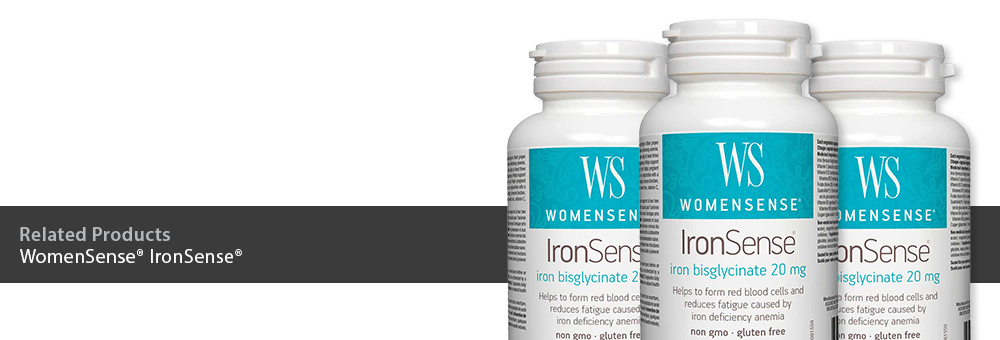
Low Iron Means Low Energy.
Iron deficiency is a common health problem and can have a significant impact on quality of life. It develops as the body’s iron reserves become depleted and less able to supply its cells with iron. Causes include:
- Low dietary intake of absorbable iron
- Increased iron requirements due to pregnancy
- Diminished iron absorption due to dietary inhibitors
- Some types of infection
- Increased demand for iron because of growth or menstrual losses (1)
Chronic iron deficiency can lead to iron deficiency anemia, where haemoglobin (the iron-containing part of red blood cells) levels become too low to transport oxygen throughout the bloodstream. Symptoms include:
- Tiredness
- Weakness
- Poor concentration
- Irritability
- Lower resistance to infection (1)
In addition to iron, deficiencies in folate, vitamins B6 and B12, copper, and vitamin C can also be risk factors for developing anemia (1,2).
Iron supplementation is an effective way to help relieve symptoms of fatigue due to low iron levels. A double-blind, placebo-controlled trial found that women who were supplemented with 80 mg of elemental iron per day experienced a 29% decrease in fatigue after one month, while women who took the placebo experienced only a 13% decrease (3).
Pregnancy affects a woman’s normal iron status, which can impact fetal development. Iron deficiency is the most prevalent nutrient deficiency during pregnancy. The World Health Organization reports that 56% of pregnant women in developing countries and 18% of pregnant women in industrialized countries are anemic (4). Many of these women have low iron levels before becoming pregnant. An analysis of 44 clinical trials calculated that iron supplementation reduces anemia during pregnancy by 70% and reduces iron-deficiency anemia at term by 57% (1).
IronSense™ from WomenSense® contains ferrous bisglycinate, an amino acid chelate that makes the iron both highly absorbable and less likely to cause gastrointestinal complaints than sulfate forms (5,6). A double-blind study revealed that supplementation with 25 mg of iron in the ferrous bisglycinate form is equally as effective as 50 mg of ferrous sulfate in helping to prevent iron deficiency anemia during pregnancy (7).
Folate, vitamin B12, vitamin C, and copper are cofactors that help with iron’s absorption into and use by the body. Folate is an especially vital nutrient that is needed to prevent neural tube defects and pregnancy complications. A clinical review of 6,708 birth studies identified that women who took between 0.4 mg and 4 mg of folate per day significantly reduced their baby’s risk of neural tube defects compared to women in control and placebo groups (risk ratio 0.31) (8). Quatrefolic (5-methyltetrahydrofolic acid or 5-MTHF) is folate’s most biologically active form. Supplementation with this form eliminates the body’s need to convert folate into its active 5-MTHF form.
Similarly, methylcobalamin and pyridoxal-5-phosphate (P5P) are the active forms of vitamins B12 and B6, respectively. By supplementing with these most active forms, they are ready for biological use immediately after being absorbed. In contrast, inactive forms, such as cyanocobalamin and pyridoxine hydrochloride, require challenging metabolic steps to convert them into their active forms.
Altogether, IronSense™ provides an effective formula, combining iron bisglycinate with bioactive B vitamins, folate, copper, and vitamin C for optimal absorption and bioavailability, as well as the methylcobalamin form of B12, pyridoxal-5-phosphate (P5P) B6, and high-quality Quatrefolic® folate. IronSense™ is gentle on the stomach and ideal for maintaining healthy iron levels and preventing anemia.
References :
1. Pena-Rosas, J.P., De-Regil, L.M., Garcia-Casal, M.N., et al. (2015). Daily oral iron supplementation during pregnancy. Cochrane Database Syst Rev, 2(7), CD004736.
2. Arredondo, M., Nunez, M.T. (2005). Iron and copper metabolism. Mol Aspects Med, 26(4-5), 313-27.
3. Verdon, F., Burnand, B., Stubi, C.L., et al. (2003). Iron supplementation for unexplained fatigue in non-anemic women: double blind randomised placebo controlled trial. BMJ, 24;326(7399):1124.
4. Allen, L.H. Anemia and iron deficiency: effects on pregnancy outcome. (2000). Am J Clin Nutr, 71(5), 1280S-4S
5. Layrisse, M., García-Casal, M.N., Solano, L., et al. (2000). Iron bioavailability in humans from breakfasts enriched with iron bis-glycine chelate, phytates, and polyphenols. J Nutr, 130(9), 2195-9.
6. Ferrari, P., Nicolini, A., Manca, M.L., et al. (2012). Treatment of mild non-chemotherapy-induced iron deficiency anemia in cancer patients: comparison between oral ferrous bisglycinate chelate and ferrous sulfate. Biomed Pharmacother, 66(6), 414-8.
7. Milman, N., Jonsson, L., Dyre, P., et al. (2014). Ferrous bisglycinate 25 mg iron is as effective as ferrous sulfate 50 mg iron in the prophylaxis of iron deficiency and anemia during pregnancy in a randomized trial. J Perinat Med, 42(2), 197-206.
8. De-Regil, L.M., Pena-Rosas, J.P., Fernandez-Gaxiola, A.C., et al. (2015). Effects and safety of periconceptional oral folate supplementation for preventing birth defects. Cochrane Database Syst Rev. (12), CD007950.


